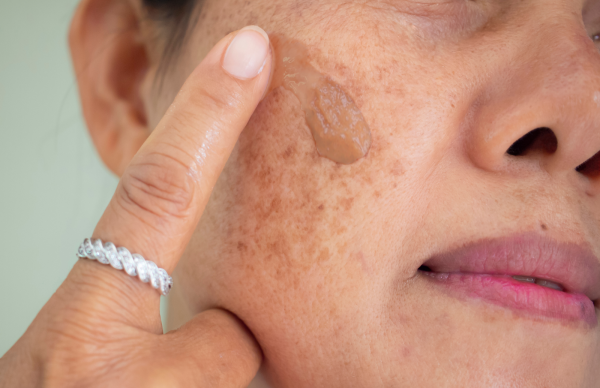
How To Get Rid Of Dark Spots On Face
Dark spots on your face, also known as hyperpigmentation, can be frustrating to deal with. Whether they’re caused by acne scars, sun exposure, or hormonal changes, they often leave you feeling like your skin isn’t at its best. The good news? With the right skincare routine and treatments, you can significantly reduce their appearance and restore your confidence. Here’s a detailed guide to help you achieve brighter, more even-toned skin.
What Causes Dark Spots on the Face?
Dark spots develop when your skin produces too much melanin, the pigment responsible for your skin’s color. Understanding the root cause of these spots can help you choose the most effective treatment. Here are the common culprits:
- Sun Exposure: UV rays stimulate melanin production, leading to sunspots or freckles over time.
- Post-Inflammatory Hyperpigmentation (PIH): This happens after acne, cuts, or irritation as the skin heals.
- Hormonal Changes: Conditions like melasma, often triggered by pregnancy or birth control, cause larger, patchy dark spots.
- Aging: As we age, melanin production becomes uneven, leading to age spots or liver spots.
- Skin Sensitivity: Irritation from harsh skincare products or over-exfoliation can trigger dark spots.
Effective Treatments to Fade Dark Spots
1. Incorporate Targeted Ingredients into Your Routine
Certain ingredients work wonders in reducing dark spots. Look for these in your serums and moisturizers:
- Vitamin C: Known for its brightening properties, this antioxidant neutralizes free radicals and reduces melanin overproduction.
- Niacinamide: A form of Vitamin B3 that reduces pigmentation, strengthens your skin barrier, and improves texture.
- Retinol: A Vitamin A derivative that boosts cell turnover, helping to fade dark spots over time.
- Azelaic Acid: Gentle yet effective, this ingredient treats discoloration and soothes irritated skin.
- Kojic Acid: Derived from fungi, kojic acid lightens hyperpigmentation and inhibits melanin production.
2. Always Wear Sunscreen
Sunscreen is your first line of defense against dark spots. Exposure to UV rays can make existing spots darker and undermine your treatment efforts. Choose a broad-spectrum sunscreen with SPF 30 or higher and reapply throughout the day. Tinted sunscreens can also double as a color corrector while protecting your skin.
3. Gently Exfoliate
Exfoliating removes dead skin cells and helps active ingredients penetrate more effectively. Try these options:
- Chemical Exfoliants: AHAs (like glycolic or lactic acid) and BHAs (like salicylic acid) dissolve surface pigmentation without causing microtears.
- Physical Exfoliants: Use sparingly and opt for gentle formulations to avoid irritation.
4. Explore Professional Treatments
If at-home treatments don’t deliver the results you want, consider these dermatologist-recommended procedures:
- Chemical Peels: These remove the top layer of skin, revealing brighter, fresher skin underneath.
- Laser Therapy: Targets deeper pigmentation by breaking down melanin clusters.
- Microneedling: Stimulates collagen production, evening out skin tone over time.
- Prescription Treatments: Stronger formulations like hydroquinone or tretinoin can offer dramatic results when prescribed by a professional.
Lifestyle Tips to Prevent Dark Spots
While treating dark spots, preventing new ones is equally important. Here are some daily habits to adopt:
- Don’t Pick at Pimples: Picking can lead to scarring and PIH. Let your acne heal naturally.
- Stay Hydrated: Drinking enough water helps your skin regenerate and stay healthy.
- Eat a Balanced Diet: Antioxidant-rich foods, such as fruits, vegetables, and green tea, combat free radical damage.
- Use Gentle Products: Avoid harsh scrubs or overly strong actives that may irritate your skin.
- Protect Your Skin: Wide-brimmed hats and sunglasses can reduce sun exposure when outdoors.
How Long Does It Take to See Results?
Fading dark spots requires patience. Most treatments show noticeable improvements within 6-12 weeks of consistent use. Professional treatments may deliver faster results, but even then, follow-up care and sunscreen are essential to maintain your progress.
Frequently Asked Questions About How To Get Rid Of Dark Spots On Face
1. What are the most effective treatments for dark spots?
Skincare ingredients like Vitamin C, niacinamide, and retinol work well, while chemical peels and laser therapy are options for stubborn spots.
2. Can dark spots be prevented?
Yes. Daily sunscreen, avoiding skin trauma, and maintaining a gentle skincare routine can help prevent dark spots.
3. How often should I exfoliate to reduce dark spots?
Exfoliate 2-3 times a week with a chemical exfoliant for best results. Avoid over-exfoliating, which can irritate your skin.
4. Can dark spots go away on their own?
Mild cases of hyperpigmentation, like those from acne, may fade over time. However, targeted treatments speed up the process.
5. Is it safe to use hydroquinone?
Yes, when used under a dermatologist’s guidance. Hydroquinone is effective but can cause irritation if overused.
6. Can makeup make dark spots worse?
Heavy or comedogenic makeup may clog pores and worsen acne-related spots. Always remove makeup thoroughly and opt for non-comedogenic products.
7. Do natural remedies work for dark spots?
Natural remedies, such as aloe vera or turmeric, may offer mild benefits but aren’t as effective as clinically proven treatments.
8. What’s the best sunscreen for dark spots?
Choose a broad-spectrum SPF 30+ sunscreen with added antioxidants or a tinted formula for extra coverage.
9. Are dark spots a sign of a serious health issue?
In most cases, dark spots are harmless. However, consult a dermatologist if spots change in size, shape, or color.
10. How do I know if a treatment is right for my skin?
Always patch-test new products and consult a dermatologist if you’re unsure or have sensitive skin.
Conclusion
Dark spots may take time to fade, but with the right skincare ingredients, daily sun protection, and consistent care, you can achieve a more even complexion. Choose treatments suited to your skin type and remember to protect your skin from further damage. For stubborn spots or deeper concerns, consult a dermatologist for personalized options. Healthy, glowing skin starts with the right steps—and every step you take gets you closer to your goal.

Leave a Reply